This is a quick reference guide on how cards from Battle for Zendikar work in Two-Headed Giant. These explanations assume you’re already familiar with how these cards work in a normal game. You can find the regular release notes here.
While in most cases the wording of the card itself makes it sufficiently clear how it works in 2HG (see Golden Rule below), there are some areas with extra rules baggage. This mostly concerns the combat phase and life total changes. Cards with such interactions are explained here so you do not have to look up the specific rules themselves. If you do want to know more about the rules of the format in general, check out the 2HG FAQ as well.
The most important thing to remember is the Golden Rule of 2HG: “You” still refers to you alone, not both you and your teammate. For example, cards that boost “creatures you control” or cards that trigger whenever something enters the battlefield “under your control” or whenever “you cast” something still only look at your own cards. There are a few rare instances where “you” does refer to your team but those will always be specifically mentioned in the Release Notes.
If you’re going to play in a 2HG prerelease and you would like to know which cards to look out for, you should also check out the 2HG Hidden Gems article.
And the award for Will Tilt The Most Heads In Games goes to Bane of Bala Ged this time!
If you have any additional questions or comments, please do not hesitate to contact us.
GENERAL NOTES
New Mulligan Rule
Starting with the Battle for Zendikar prerelease the new mulligan rule will go into effect (read the full explanation here). After every player is done with mulligans, each player who has less than seven cards can scry 1, in turn order. For Two-Headed Giant there are two things to keep in mind.
- Each player gets a free mulligan in 2HG so if you mulligan the first time you draw seven cards again. If you keep these you do NOT get to scry. You only scry if you go down to six or less cards. While in everyday conversion it’s convenient to say that you get to scry if you mulliganed, the actual rule is that players who have less cards in their hand than their starting hand size may scry. A subtle distinction that is relevant for 2HG.
- If both players on a team go down to six or less cards and get to scry, they do so simultaneously, just like taking mulligans, and thus can look at each other’s top card and consult with each other before making the decision to put it on the top or the bottom. It does not matter how many times players mulliganed for this. Even if one players goes to six and the other goes to four, they both scry at the same time.
Ingest
Ingest is a new keyword ability for creatures that triggers whenever the creature deals combat damage to a player.
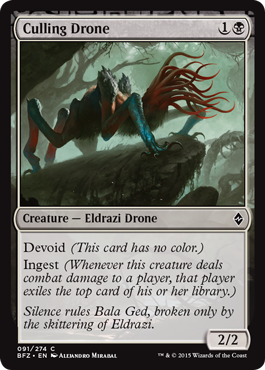
- You attack the defending players together as a team, but in the Combat Damage Step you choose which opponent to deal a creature’s combat damage to and thus from which opponent a card will be exiled with the Ingest trigger. The creature does not deal combat damage to both opponents.
- The defending team does not know who would be dealt damage when they have to decide how to block.
- If you have multiple unblocked creatures with Ingest, you choose for each creature individually an opponent to deal its combat damage to. You can let all creatures ingest from one opponent or divide between the opponents if you wish.
- If a creature has both ingest and double strike (from Resolute Blademaster for example) you can choose to have it deal first strike damage to one opponent and normal damage to the other if you wish to ingest from both opponents.
Life gain matters
![]()
![]() has a life gain theme in Battle for Zendikar and a number of cards have abilities that trigger whenever you gain life.
has a life gain theme in Battle for Zendikar and a number of cards have abilities that trigger whenever you gain life.
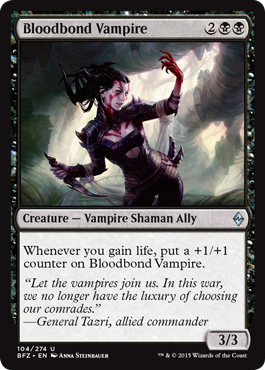
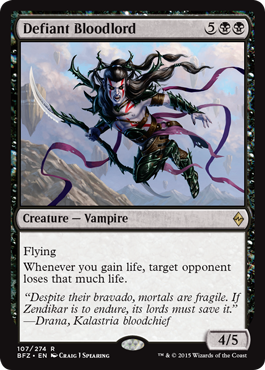
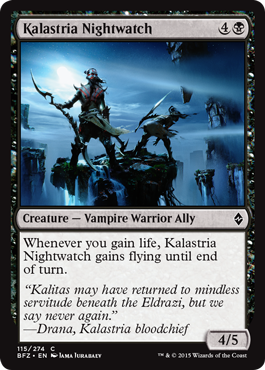
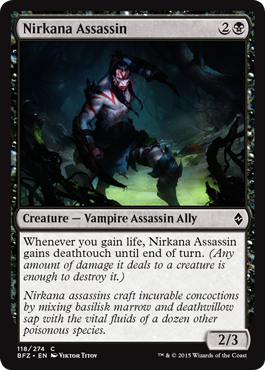
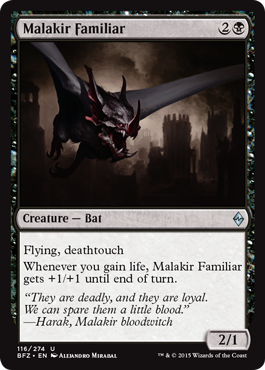
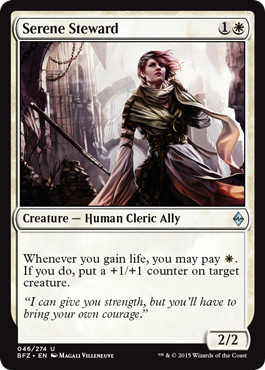
Bloodbond Vampire, Defiant Bloodlord, Kalastria Nightwatch, Nirkana Assassin, Malakir Familiar, Serene Steward
- These cards do not trigger when your teammate gains life. While your life total is shared in 2HG, changes to that life total are still treated as happening to players individually.
‘Drain’ life
To complement the life gain matters theme there are a number of cards that ‘drain’ life. The amount of life gained is not tied to the amount of life lost however.




Drana’s Emissary, Kalastria Healer, Retreat to Hagra, Zulaport Cutthroat
- These cards all make you simply gain 1 life, not 1 life for each opponent who loses 1 life. In a 2HG game your opponents would lose 2 life in total and you would gain 1 life in total from these triggers.
Golden Rule Corner
The Golden Rule of 2HG: “You” still refers to you alone, not both you and your teammate. In this segment we’ll note which new mechanics are subject to this rule.
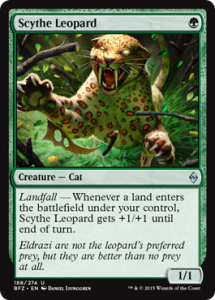
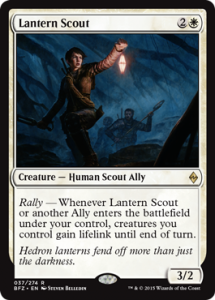
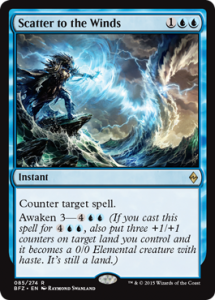
Landfall, Rally, Awaken
- Landfall triggers when a land enters under your control, rally triggers when an ally enters under your control and it boosts creatures you control, awaken targets a land you control. These mechanics do not interact with your teammate.
CARD-SPECIFIC NOTES

Angelic Captain
- The second ability counts your teammate’s attacking allies as it does not mention “you control”.
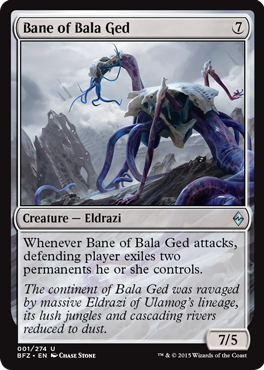
Bane of Bala Ged
- The ability triggers only once, not for each opponent. When the trigger resolves you choose one of the defending players who has to exile two permanents. You can’t make both players exile one permanent.
- When this ability resolves and you have chosen one of the defending players, that player has to exile two permanents immediately. The defending players have no opportunity to respond to this choice. If they want to cast or activate anything they have to do so before they know who will be chosen.
- The choice has no bearing on other choices about ‘defending player’ or who you’re attacking. For example, you can attack one opponent’s planeswalker but choose the other opponent with this ability.

Felidar Sovereign
- In 2HG your life total is the same as your team’s life total.

Ondu Rising
- This will give your teammate’s attackers lifelink as it does not mention “you control”.
- Even though you granted the ability to your teammate’s creatures, their lifelink counts as your teammate gaining life, not you gaining life. Your teammate’s creatures will not trigger any life gain matters cards (mentioned above) you control but it will trigger any such cards your teammate controls.

Part the Waterveil
- In 2HG if you take an extra turn, your team takes an extra turn.
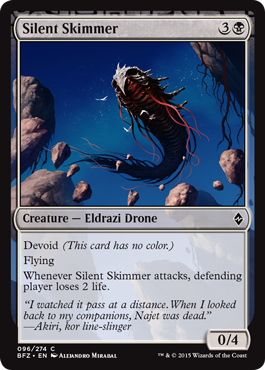
Silent Skimmer
- The third ability triggers only once, not for each opponent. When the trigger resolves you choose one of the defending players who loses 2 life.
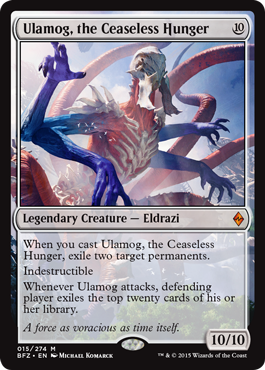
Ulamog, the Ceaseless Hunger
- The third ability triggers only once, not for each opponent. When the trigger resolves you choose one of the defending players who has to exile twenty cards.
- When this ability resolves and you have chosen one of the defending players, that player has to exile twenty cards immediately. The defending players have no opportunity to respond to this choice. If they want to cast or activate anything they have to do so before they know who will be chosen.
- The choice has no bearing on other choices about ‘defending player’ or who you’re attacking. For example, you can attack one opponent’s planeswalker but choose the other opponent with this ability.
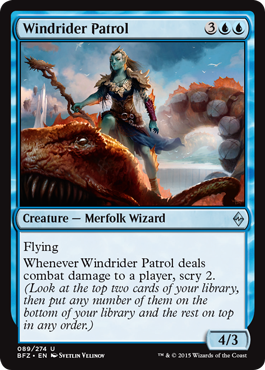
Windrider Patrol
- You attack the defending players together as a team, but in the Combat Damage Step you choose one opponent to deal a creature’s combat damage to. It does not deal combat damage to both opponents.
